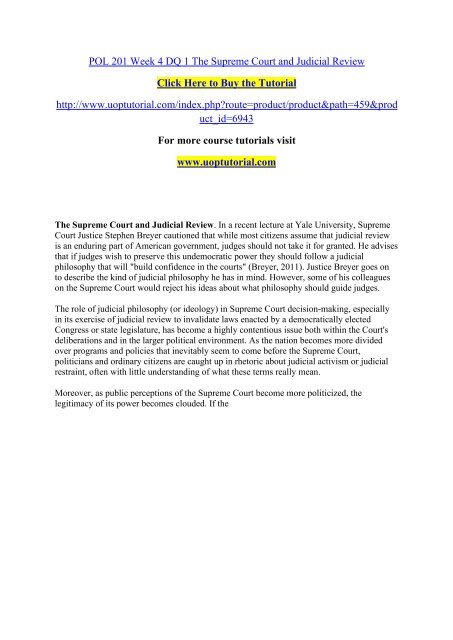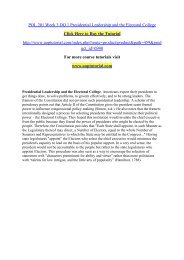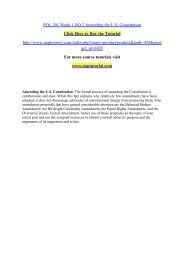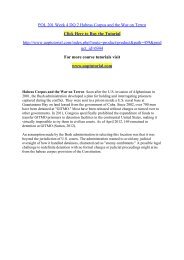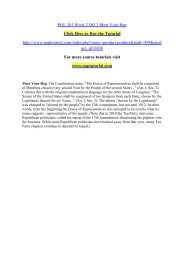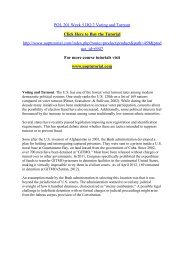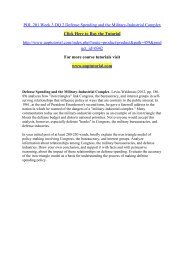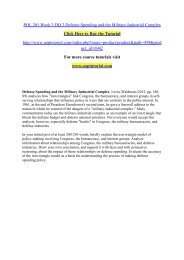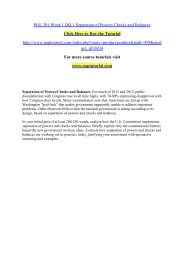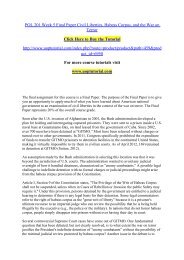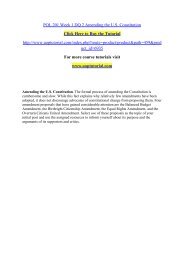POL 201 Week 4 DQ 1 The Supreme Court and Judicial Review/ Uoptutorial
For more course tutorials visit www.uoptutorial.com The Supreme Court and Judicial Review. In a recent lecture at Yale University, Supreme Court Justice Stephen Breyer cautioned that while most citizens assume that judicial review is an enduring part of American government, judges should not take it for granted. He advises that if judges wish to preserve this undemocratic power they should follow a judicial philosophy that will "build confidence in the courts" (Breyer, 2011). Justice Breyer goes on to describe the kind of judicial philosophy he has in mind. However, some of his colleagues on the Supreme Court would reject his ideas about what philosophy should guide judges.
For more course tutorials visit
www.uoptutorial.com
The Supreme Court and Judicial Review. In a recent lecture at Yale University, Supreme Court Justice Stephen Breyer cautioned that while most citizens assume that judicial review is an enduring part of American government, judges should not take it for granted. He advises that if judges wish to preserve this undemocratic power they should follow a judicial philosophy that will "build confidence in the courts" (Breyer, 2011). Justice Breyer goes on to describe the kind of judicial philosophy he has in mind. However, some of his colleagues on the Supreme Court would reject his ideas about what philosophy should guide judges.
You also want an ePaper? Increase the reach of your titles
YUMPU automatically turns print PDFs into web optimized ePapers that Google loves.
<strong>POL</strong> <strong>201</strong> <strong>Week</strong> 4 <strong>DQ</strong> 1 <strong>The</strong> <strong>Supreme</strong> <strong>Court</strong> <strong>and</strong> <strong>Judicial</strong> <strong>Review</strong>Click Here to Buy the Tutorialhttp://www.uoptutorial.com/index.php?route=product/product&path=459&product_id=6943For more course tutorials visitwww.uoptutorial.com<strong>The</strong> <strong>Supreme</strong> <strong>Court</strong> <strong>and</strong> <strong>Judicial</strong> <strong>Review</strong>. In a recent lecture at Yale University, <strong>Supreme</strong><strong>Court</strong> Justice Stephen Breyer cautioned that while most citizens assume that judicial reviewis an enduring part of American government, judges should not take it for granted. He advisesthat if judges wish to preserve this undemocratic power they should follow a judicialphilosophy that will "build confidence in the courts" (Breyer, <strong>201</strong>1). Justice Breyer goes onto describe the kind of judicial philosophy he has in mind. However, some of his colleagueson the <strong>Supreme</strong> <strong>Court</strong> would reject his ideas about what philosophy should guide judges.<strong>The</strong> role of judicial philosophy (or ideology) in <strong>Supreme</strong> <strong>Court</strong> decision-making, especiallyin its exercise of judicial review to invalidate laws enacted by a democratically electedCongress or state legislature, has become a highly contentious issue both within the <strong>Court</strong>'sdeliberations <strong>and</strong> in the larger political environment. As the nation becomes more dividedover programs <strong>and</strong> policies that inevitably seem to come before the <strong>Supreme</strong> <strong>Court</strong>,politicians <strong>and</strong> ordinary citizens are caught up in rhetoric about judicial activism or judicialrestraint, often with little underst<strong>and</strong>ing of what these terms really mean.Moreover, as public perceptions of the <strong>Supreme</strong> <strong>Court</strong> become more politicized, thelegitimacy of its power becomes clouded. If the


